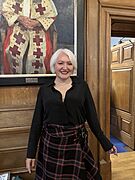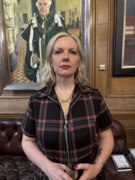Witches of Scotland facts for kids
Witches of Scotland is a campaign fighting for justice for people in Scotland who were accused of witchcraft hundreds of years ago. Between 1563 and 1736, many people, mostly women, were found guilty and executed.
The campaign wants the government to officially state that these people were innocent. It also wants a national memorial to remember them. On March 8, 2022, the Scottish government gave a formal apology for what happened.
The campaign was started by lawyer Claire Mitchell KC and writer Zoe Venditozzi. They launched it on International Women's Day in 2020. The campaign has a podcast that features experts and writers who talk about this part of Scotland's history.
Contents
Why the Campaign Started
For over 170 years, a law called the Witchcraft Act was active in Scotland. Under this law, being found guilty of witchcraft was a crime punished by death.
Historians believe that Scotland executed five times more people for witchcraft than any other country in Europe, based on its population size.
- About 3,837 people were accused of witchcraft.
- Of those, 2,558 were killed.
- A huge 84% of the people found guilty were women.
King James VI of Scotland played a big role in the witch hunts. He believed he was an expert on witchcraft and even wrote a famous book about it called Daemonologie.
What the Campaign Wants to Achieve
The founders of the Witches of Scotland campaign see this as an issue of women's rights. Because so many more women were punished than men, they believe it was unfair. By getting justice for these women, they want to send a message against the unfair treatment of women today.
The campaign has three main goals:
- A legal pardon for everyone found guilty.
- A formal apology from the government.
- A national memorial to remember the victims.
Getting a Legal Pardon
A pardon is an official statement that a person was not a criminal. The campaign wants a legal pardon to show that the people accused of witchcraft were victims of injustice.
To support their case, the campaign pointed to other times the Scottish Parliament has corrected historical wrongs. A Member of the Scottish Parliament, Natalie Don, created a bill to clear the names of the accused. In 2021, Scotland's First Minister, Nicola Sturgeon, supported the idea.
Receiving an Apology
The campaign also asked for an apology from the Scottish government. This was important because many people were accused of witchcraft but never officially found guilty. A pardon wouldn't apply to them, but just being accused often ruined their lives.
On International Women's Day in 2022, First Minister Nicola Sturgeon gave a formal apology. She said she was sorry on behalf of the Scottish government for the terrible injustice. Another group, Remembering the Accused Witches of Scotland (RAWS), also received an apology from the Church of Scotland for its part in the witch hunts.
Creating a Memorial
The campaign is working to create a national memorial for everyone affected by the witch trials. A possible location for the memorial has been suggested in Kelty, Fife. This area was a central spot for many of the trials.
In January 2025, the Witches of Scotland campaign designed a special tartan to remember the victims. A tartan is a patterned cloth that is a symbol of Scotland. The colors in the tartan have special meanings:
- Black: Represents the dark times of the witch hunts.
- Grey: Symbolizes ashes.
- Red: Stands for the blood that was shed.
- Pink: Represents the legal tape used in official documents.
Media and Public Awareness
The campaign has worked to teach people about this history. The founders appeared on a BBC show and created their own podcast. They also wrote a book about the witch trials and the campaign for justice.
- Claire Mitchell KC and Zoe Venditozzi, the campaign's co-founders, at the Scottish Parliament. They are wearing the Witches of Scotland memorial tartan.
See also
- Witch trials in early modern Scotland
- Great Scottish Witch Hunt of 1597
- Great Scottish Witch Hunt of 1661–62
- Great Scottish witch hunt of 1649–50
- Survey of Scottish Witchcraft
- List of people executed for witchcraft



